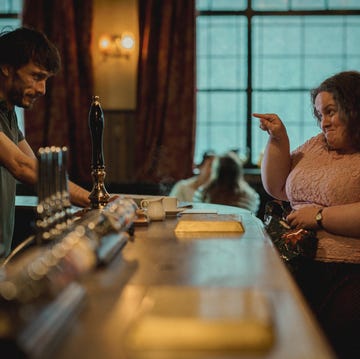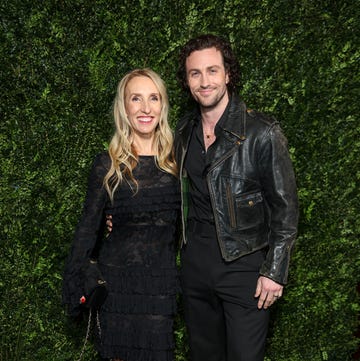A company offering to give its employees indefinite paid maternity leave during the first year of parenthood, as Netflix announced last month, shouldn’t be an earth-shattering thing. And yet here we are, jaws still on the floor in reaction to the news. We've become more accustomed to the Marissa Mayers of the world — last week the Yahoo chief announced she would be taking 'limited time' off after giving birth to twins in December. And if you're wondering what that means, we're placing bets on two weeks, which is how long she took after giving birth to her first child. But is the world really as unsupportive of working mothers as it seems? There’s a debate over motherhood happening in virtually every corner of the globe: from a group of women suing the ecommerce site NastyGal for firing them during pregnancy in America to the controversial implication in a summer issue of the New Statesman that the UK’s most prominent women politicians reached the top because they are childless to the ongoing debate over rising C-section rates the world over.
To understand what young working women are up against, I asked three pregnant women in three different international cities around the world to chronicle their third trimesters as they prepare to leave the office and begin an even bigger chapter of their work lives. Like the cities they live in—New York, London and Stockholm—their experiences are as different, as they are similar.
'When I first found out I was pregnant, I was in the middle of getting a promotion.'
New York
Kathryn Chen, communications executive
I’m 38 weeks along and I feel pretty great. I ran four miles this morning. I haven’t started my maternity leave yet but I’ve worked out a deal with my company in which I can work from home during the final weeks so that I’m not so far from the hospital. I’m going to take 4 and 1Ž2 months off for my maternity leave and I know that’s very good and generous. When my mom had me, she was back to work after six weeks. And most of my friends get what my mother did. If they’re lucky they’ll get 12 weeks. So in a way, I feel like I’ve hit the jackpot. When I first found out I was pregnant, work was one of the first things that came to my mind. I was in the middle of a promotion and had to think about when to tell people and how much time to take off. But my colleagues have been very supportive. I think it helps to work with people who have their own families.
London
Sharnjit Biring, human resources executive
I took off six months from work when I had my first baby, and that was shorter than what many women I know take. I had a project that I needed to go back to work to complete. But for this pregnancy, I’m essentially a stay at home mom and am entitled a maternity allowance pay from the government. I’m 36 weeks along and in a place where I’m just relaxing and preparing myself. I’ll return to work roughly a year from now. I think that a year is a good amount of time for a woman to get settled and adjust to her baby. The problem is, some women — even the most professionally driven — take time off work, get attached to their babies and realise they don’t want to return to work. So I think more companies should use maternity incentives to encourage women to come back to work after having children.
Stockholm
Jenny Nylinder, project manager
We were trying to get pregnant. Every month we took the test, for four or five months. So when I saw that it was positive, I was so happy. For me, having a child at 30 was a part of my life plan. I think it’s a good age to have a child, but it’s also a good age to go to the next level in your career. I had just started a new position at my company six months before I got pregnant. So of course it wasn’t the optimal time in my career. I found a good role and I want to keep it. But I don’t want to be too old when I have a child and encounter problems conceiving later. So I figured I better prioritize the family now. I’m in week 34 of my pregnancy and have three weeks left at work. I’ll then take two weeks of holiday and then start my maternity leave two weeks before my due date. I’ll be taking 13 months off from work, at least. Most of my friends take that length of time. Between my husband and I, we get 18 months of maternity and paternity leave and we get 80% of our salary from the government for most of that time. Out of that time, one of the parents has to take at least two months. And it doesn’t have to be 18 months in a row. That time can be used until the baby is 8 years old. I can take this money that the government gives me and take one month every summer. But I have to tell my employer. You tell your employer two months ahead of time that you want to take parental leave. It’s very flexible in that way. Many people take advantage of that. In Sweden, the holidays for kids are quite long. And it’s hard to cover that with your vacation from work. So if you have a kid you’d save some of your parental days and use them during the summer instead. Normally, you’d take a year when the baby is born. And then the father takes a few months and then a few weeks every summer. That’s our plan. And on top of that, the parents don’t pay anything for antenatal care. The government provides all of that. Sweden is a very baby friendly country.
'Even if you are actually out of control you want them to pretend you’re in control.'
Kathryn
I’m giving birth in a hospital. I plan to go in and have an epidural. I have many friends who have had natural births in recent months, I’m happy that they enjoyed the fact that they did it. I’m going the traditional birth route. I’d like to have a vaginal delivery. I’m at the point where I have a doctor’s appointment every week. It’s increased in the last month. Before that, I’d see the doctor every two weeks. I feel like I live there. I’ve had a very healthy pregnancy so there’s not much to be concerned about. The actual appointments take about five minutes. I have a high deductible insurance plan, which essentially means you pay less per month for coverage but have a higher deductible to meet before your insurance coverage kicks in. So I was billed for all tests, scans, and visits up to our deductible amount, which was easy to do. With the number of visits and tests I had, we actually met our deductible within the first two and a half months of the pregnancy. Once I hit the deductible, my insurance paid 80% and I paid 20% of the rest of my medical bills and continue to do so.
I had to find a new doctor in my first trimester because the original doctor I had doesn’t deliver babies. And I found out that it’s a big thing to get a doctor who delivers in the hospital where you want to have your baby. Some people have opinions about certain hospitals. So you have to get the right doctor who delivers in the hospital you want to deliver at. I’m going with Mount Sinai. It also happens to be 12 blocks from my apartment. New York has some of the best hospitals in the world.
Sharn
I’m okay, health-wise. I just had an appointment with the midwife and have been given the all clear. I see the midwife every two weeks. I’m more tired than I was with the first pregnancy. I’m planning to have a normal, vaginal delivery in the birthing pool in a birth center at a hospital. That’s how I had my first baby. To me it’s the nicest way to deal with labour, to to have a baby in a lovely surrounding. If you’re giving birth through the National Health Service you have to choose a hospital that is local to where you live. The birth center where I had my daughter was amazing, like a hotel. I had my own room with a sofa bed, television, music system and a cot bed for the baby. I plan to go there again for this delivery. I’m also going to have a water birth. I’m too much of a wuss to have a C-section. I used to hear slogans about cesareans like, 'Too posh to push.' But then when you look at it, C-sections are really the hardest and the women have the least say. It’s more traumatic and the recovery time is longest. I like that in the birth center, the midwife leads the birth. Because I feel like it’s with that approach that the birth is really lead by me. But if I were in the hospital ward, I’d be at the mercy of all these doctors and specialists. I don’t want to be told, 'You’re having an epidural and an episiotomy.' During the last birth the midwives kept asking me, ‘Are you okay? Do you want to do this?’ Even if you are actually out of control you want them to pretend you’re in control.
Jenny
I’m just resting today. I’m a bit tired, emotionally a little bit unstable. My husband has to deal with that. I start crying a lot. I had a doctor’s appointment today (I have them every second Tuesday.) I’m planning a natural birth. But in the beginning I was afraid of physical changes, tearing, having problems going to the toilet, those kinds of fears. In Sweden it’s always the same when a woman gives birth. You pick the hospital —in Stockholm there are about 7 or 8 to choose from — and you always get two nurses. The nurses are generally women. The doctor only comes in if something goes wrong. It’s always the same unless you have complications. In Sweden they are very concerned with the fact that the mother should be comfortable so it is very common for women giving birth to ask for another nurse if they don’t like the nurse they are assigned. You can just say, ‘Can I please have another nurse?’ and they will send another nurse. It’s very flexible. They would never take offense. And at work, my maternity cover has already started so we’ve been working in parallel for a few weeks. It feels good. I’m working one more week and then I’m going to have almost four weeks off. So I’m not stressed about the office at all.
'I won’t receive a single bill for any of it.'
Kathryn
The baby arrived five days early! His name is Roy. I was in Central Park with my husband and friends my water just completely broke. I only thought that happened in movies. Mine was exactly like that. So we grabbed a cab and went home and started counting contractions and called my doctor. The minute your water breaks you’re kind of in labor but it doesn’t always work that way. So I waited it out. But then I didn’t want to risk infection, so I went to the hospital five hours later, but the contractions were irregular. So I ended up having to go on Pitocin to speed everything up which is why I think my labor took so long. My doctor told me that my labor really didn’t begin until I started the Pitocin. I probably started labor at 7:30pm on the 19th and gave birth at 5am on the 20th.
During the labor, my baby’s heart rate decelerated three times during the process. The first time it happened they told me that if it continues to happen I’d potentially need a C-section. By the third one, though, I was nervous. So I was really happy with the doctor telling me what my options were but keeping me well warned about the possibilities. The actual pushing part was maybe 20 minutes when everything finally came together. It was exactly what I wanted: a normal vaginal birth.
Sharn
I was due on a Monday. I didn’t sleep properly that Wednesday night and felt like maybe something was going to happen. Then Thursday evening, I was like, ‘Yeah I think I need to sit down.’ Come midnight we went to the birth center and were given the same room that I had my first daughter in! I was only 3 centimeters dilated when I arrived, so they let me stay and make myself comfortable in the room. My second daughter, Diya, was out 12 hours later. I had a water birth again. And this time I knew what was coming. So the birth wasn’t scary, I just dreaded the pain since I knew what I was in for after prior experience. But I had a midwife, a student midwife and my husband in the room and the experience overall was fab. I had no complications and the baby is healthy. It was all very smooth really. And because I had the baby through the NHS, I won’t receive a single bill for any of it.
Jenny
I just found out my baby boy is in a breech bottom down position and I will have a C-section in about 10 days. In Sweden the hospital offers to try to turn the baby. So I got an appointment the next morning at the hospital and two doctors and a nurse tried to turn him. Unfortunately it didn’t work. Then I was presented with a choice: either try to have a vaginal delivery with him as he is currently positioned or have a C-section. I chose a C-section. At first I felt disappointed that I wasn’t going to have a natural birth. Now I am starting to feel better because at least I know the date that I will get to see my baby boy and I am counting down the days.
Kenya Hunt is the Editor-in-Chief of ELLE UK. Her career spans working for some of the world's most influential women’s titles on both sides of the Atlantic from her post-graduate days as an Assistant Editor at the seminal magazine, Jane, to her time as Deputy Editor of Grazia UK and ELLE UK. As the founder of R.O.O.M. Mentoring, she advocates for greater diversity within the fashion industry by providing a supportive network for some of the many talented aspiring designers, journalists and image makers of colour London has to offer. In 2021, she was recognised by The British Fashion Council for her work and given a Global Leader Of Change Award at its annual Fashion Awards. An American based in London, she lives south of the river with her husband and two sons. Her critically-acclaimed book, Girl: Essays on Black Womanhood (HarperCollins/HQ), is out now.












